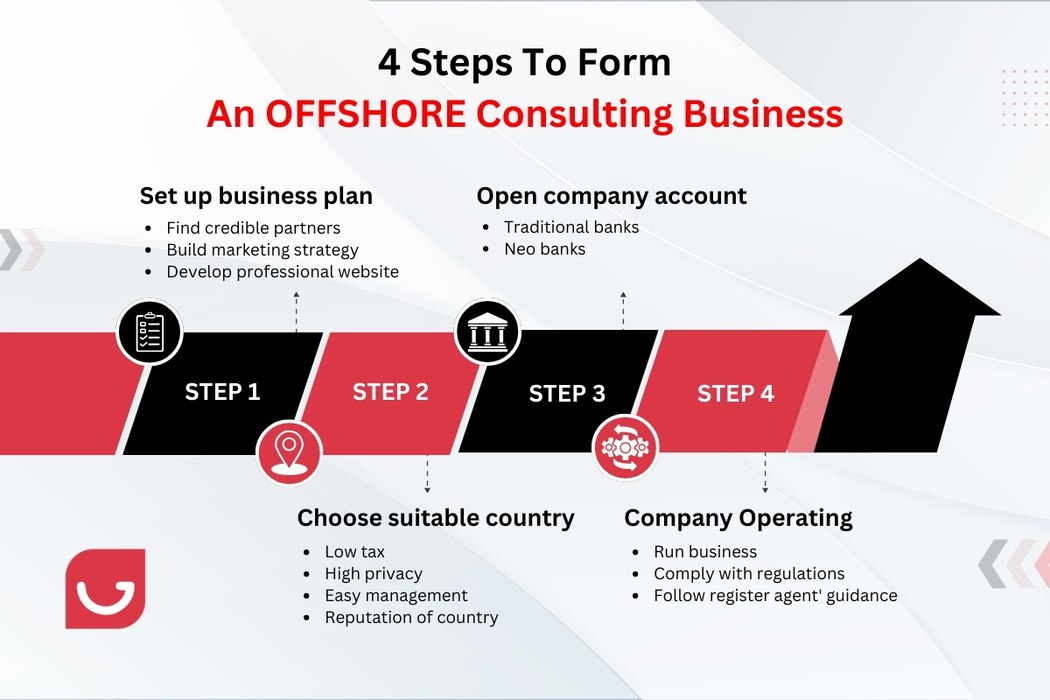Comprehending Offshore Company Formations: A Comprehensive Guide to the Process and Benefits
Offshore firm formations provide a calculated avenue for business owners seeking to enhance their organization procedures. These entities usually give benefits such as tax obligation benefits, raised privacy, and robust asset protection. Nonetheless, recognizing the ins and outs of selecting a territory, the formation procedure, and compliance demands is necessary. As the landscape of international business develops, the implications of developing an overseas company warrant cautious factor to consider. What steps should one require to browse this complex surface?
What Is an Offshore Firm?
An offshore business is a business entity integrated outside the territory of its proprietors' house, usually in a country with beneficial regulative and tax obligation environments. These business can offer different purposes, consisting of possession defense, worldwide trading, and wealth management. They are normally developed in jurisdictions referred to as tax obligation sanctuaries, where company tax obligation prices are missing or low, and privacy legislations are rigid.
Offshore firms might be owned by individuals or other corporate entities and can operate in different fields, including shopping, consulting, and money. While they offer certain advantages, the regulatory and legal structures controling overseas firms differ significantly by jurisdiction. Local business owner must browse these complexities to guarantee compliance with both international and local regulations. Understanding the framework and feature of overseas firms is vital for people considering this choice for company operations or possession administration.
Advantages of Developing an Offshore Company
While the decision to develop an offshore business might come from numerous strategic considerations, the possible benefits are compelling for lots of entrepreneur. One substantial advantage is tax optimization; numerous overseas jurisdictions provide beneficial tax prices and even tax obligation exemptions, permitting business to retain even more profits. In addition, offshore companies frequently give improved privacy security, shielding the identifications of shareholders and supervisors from public analysis.

Business proprietors might locate operational adaptability, as offshore territories frequently have less regulatory difficulties, allowing structured administration and governance. Jointly, these advantages make overseas firm formations an attractive choice for several seeking to increase their company horizons.
Selecting the Right Jurisdiction
Selecting the suitable jurisdiction for an overseas company is a crucial action in making best use of the advantages laid out earlier. Different factors influence this choice, consisting of tax guidelines, corporate regulations, and the overall service environment. Jurisdictions such as the British Virgin Islands, Cayman Islands, and Singapore are commonly preferred for their favorable tax routines and durable legal frameworks.
It is essential to consider the particular requirements of the company, such as privacy demands and governing compliance. Additionally, the convenience of doing business, consisting of the effectiveness of company registration and banking facilities, plays a considerable function.
Prospective owners must additionally review the political security and credibility of the selected jurisdiction, as these aspects can impact lasting success. Ultimately, complete study and expert appointment are advised to assure positioning with the business's goals and to take advantage of the full capacity of offshore advantages.

The Offshore Business Formation Process
The overseas company development procedure involves a series of essential steps that call for careful preparation and execution. Initially, businesses or individuals have to select an appropriate territory that aligns with their objectives, considering variables such as tax advantages, personal privacy, and regulatory setting. Following this, the following action involves choosing the appropriate company structure, such as an International Organization Business (IBC) or Minimal Responsibility Firm (LLC)
Once the framework is established, required documents, including a service plan, identification, and evidence of address, need to be prepared. Engaging a trusted regional representative or solution copyright can simplify this stage, making certain conformity with neighborhood regulations. After submitting the required documentation to the relevant authorities, the development process commonly finishes in the issuance of a certification of unification. This record develops the business as a legal entity, allowing it to conduct company internationally.
Lawful Needs and Conformity
Comprehending the legal needs and conformity responsibilities is vital for anybody wanting to establish an overseas business. Each jurisdiction has details laws that must be followed, which can consist of company registration, obtaining essential licenses, and keeping regional addresses. Offshore Company Formations. It is important to assign a signed up agent that can promote communication with local authorities and warranty compliance with recurring reporting requirements
In addition, lots of jurisdictions call for the submission of yearly monetary statements, along with tax obligation filings, even if the firm does not produce earnings. Shareholders and directors need to be determined, with due persistance procedures typically mandated to validate their identities. Failing to meet these lawful obligations can cause penalties or the dissolution of the business. Therefore, potential overseas business proprietors need to talk to attorneys experienced in international business regulation to navigate these complexities properly and guarantee full conformity with all regulations.
Tax Ramifications of Offshore Firms
The tax ramifications of overseas companies present significant advantages that bring in many entrepreneurs. Comprehending the linked conformity needs is necessary for steering the intricacies of international tax legislations. This area will certainly check out both the possible benefits and the required commitments associated view with offshore company structures.
Tax Benefits Introduction
Although overseas firms are often checked out with hesitation, they can supply considerable tax obligation benefits for businesses and individuals seeking to enhance their monetary methods. Among the key advantages is the possibility for lower corporate tax prices, which can cause considerable savings. Many overseas territories supply positive tax regimes, consisting of no or minimal tax obligation on revenues, resources gains, and inheritance. Furthermore, offshore firms can help with global service operations by reducing tax liabilities associated with cross-border transactions. This structure may likewise enable tax obligation deferral chances, permitting revenues to grow without instant taxation. Eventually, these benefits add to enhanced economic efficiency and possession defense, making overseas firms an attractive option for savvy financiers and business owners.
Conformity Requirements Described
Offshore companies may offer tax obligation advantages, however they additionally come with a set of compliance needs that have to be thoroughly browsed. These entities go through certain reporting commitments, which differ significantly relying on the territory. Generally, offshore firms need to keep precise economic documents and send annual monetary statements to abide by regional regulations. In addition, many territories call for the disclosure of helpful possession to battle cash laundering and tax obligation evasion. Failing to adhere to these conformity procedures can cause severe penalties, consisting of fines and prospective loss of business licenses. Comprehending the neighborhood tax regulations and worldwide agreements is crucial, as they can influence tax obligations and general functional validity. Engaging with lawful and financial professionals is advisable to guarantee complete conformity.
Keeping and Managing Your Offshore Business
Keeping and handling an offshore business includes adhering to different recurring conformity requirements important for lawful operation. This consists of diligent economic record keeping and an understanding of tax obligation commitments pertinent to the company's jurisdiction. this contact form Effective management not just assures regulative compliance but additionally sustains the company's economic health and wellness and longevity.
Recurring Conformity Demands
Guaranteeing continuous compliance is vital for any kind of entity operating in the overseas industry, as failure to satisfy regulative demands can result in considerable charges or even dissolution of the company. Offshore business need to follow regional legislations, which may consist of yearly filing of economic declarations, settlement of essential costs, and keeping a licensed office address. In addition, firms are usually needed to appoint a regional agent or agent to facilitate interaction with authorities. Regular updates on modifications in legislation or tax obligation requirements are crucial for compliance. Adherence to anti-money laundering (AML) and know-your-customer (KYC) regulations is necessary. By keeping organized records and remaining educated, offshore firms can ensure they continue to look at this website be compliant and reduce risks related to non-compliance.
Financial Document Keeping
Efficient monetary document maintaining is vital for the effective management of any overseas company. Keeping thorough and accurate economic documents aids in tracking the company's performance, guaranteeing compliance with regional regulations, and assisting in notified decision-making. Business need to execute methodical procedures for documenting revenue, expenditures, and transactions to create openness and accountability. Utilizing bookkeeping software application can enhance this procedure, permitting real-time economic evaluation and reporting. Regularly assessing economic declarations assists determine patterns, evaluate productivity, and handle cash money circulation successfully. Moreover, it is essential to firmly save these documents to shield delicate info and assurance simple accessibility throughout audits or monetary testimonials. By focusing on careful financial document keeping, offshore firms can improve operational performance and assistance long-lasting success.
Tax Obligation Commitments Introduction
Comprehending tax commitments is vital for the proper monitoring of an overseas company, as it straight impacts financial efficiency and compliance. Offshore firms may be subject to different tax legislations depending on their jurisdiction, consisting of company taxes, value-added taxes, and withholding taxes. It is important for local business owner to remain informed regarding their tax obligation obligations, as failing to comply can cause fines and legal problems. In addition, numerous overseas territories provide tax obligation incentives, which can considerably profit companies if browsed correctly. Engaging an educated tax consultant or accounting professional specializing in global tax obligation law can assist assure that companies meet their responsibilities while optimizing their tax strategies. Ultimately, diligent tax monitoring adds to the general success and sustainability of an overseas entity.
Regularly Asked Inquiries
Can I Open a Savings Account for My Offshore Business Remotely?
The capability to open up a savings account for an overseas firm from another location relies on the financial institution's policies and the territory's policies. Lots of financial institutions use remote solutions, however details needs may vary significantly in between institutions.
What Are the Costs Associated With Creating an Offshore Business?
The costs associated with developing an overseas business typically consist of enrollment costs, legal and consulting costs, and continuous upkeep charges. These expenditures vary considerably based upon jurisdiction, intricacy of business framework, and specific services needed.
Exist Constraints on Who Can Be a Shareholder?
Constraints on investors differ by territory. Some nations might impose constraints based on citizenship, company, or residency type - Offshore Company Formations. It's vital for potential investors to research certain laws suitable to their chosen offshore area
How much time Does the Offshore Firm Development Refine Typically Take?
The overseas firm development process normally takes in between a couple of days to a number of weeks. Variables affecting the timeline include jurisdiction requirements, document preparation, and responsiveness of pertinent authorities associated with the registration process.
What Occurs if I Fail to Abide By Neighborhood Laws?
Failure to abide by regional laws can cause serious penalties, consisting of penalties, lawsuit, or loss of organization licenses - Offshore Company Formations. It might also damage the company's track record and prevent future business chances in the jurisdiction
An overseas company is an organization entity included outside the territory of its owners' house, typically in a nation with beneficial regulative and tax obligation environments. One significant advantage is tax optimization; several offshore jurisdictions offer positive tax obligation rates or also tax exemptions, allowing companies to preserve even more revenues. Overseas companies are often watched with apprehension, they can use substantial tax obligation advantages for people and businesses seeking to maximize their financial approaches. Furthermore, overseas business can help with international service procedures by minimizing tax responsibilities linked with cross-border purchases. Offshore firms may be subject to numerous tax regulations depending on their jurisdiction, consisting of business tax obligations, value-added taxes, and withholding tax obligations.